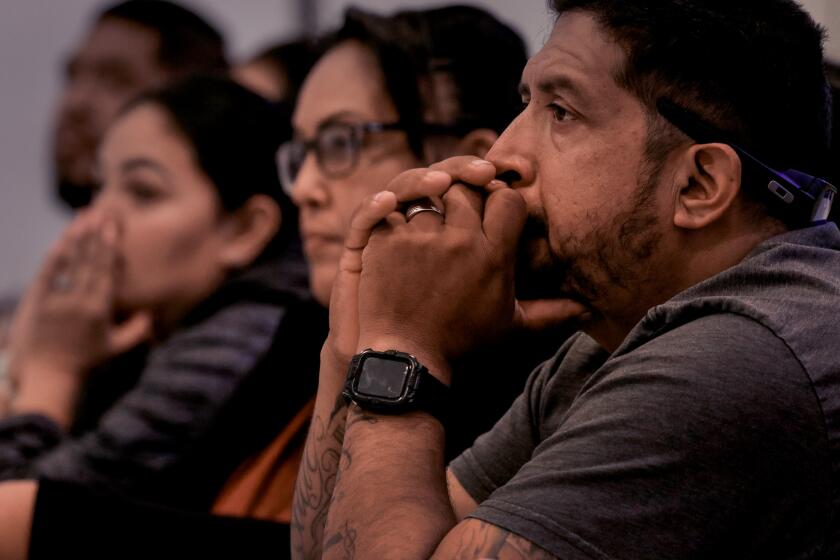U.S. strikes deal with Canada over northern border, asylum seekers

OTTAWA — The United States and Canada have struck an agreement that allows each country to turn back asylum seekers who cross the northern border without authorization, according to internal documents obtained by The Times and a source familiar with the negotiations.
The deal is the latest expansion of President Biden’s efforts to discourage asylum seekers from entering the U.S. without authorization. The new policy, which applies to people without U.S. or Canadian citizenship who are caught within 14 days of crossing the border between the two countries, is expected to take effect soon.
The U.S. hopes the pact will “reduce incentives” to cross the border irregularly, according to the source, who was granted anonymity in order to discuss the confidential agreement.
The negotiations, which had been going for several years, were completed after recent increases in the number of unauthorized crossings of the border in both directions, the source said.
Both the U.S. and Canada have struggled to deal with people who enter their country without permission. President Biden and Prime Minister Justin Trudeau were expected to begin a series of meetings in Ottawa on Thursday to discuss key strategic interests, including migration.
The new deal would update the so-called Safe Third Country Agreement between the two countries. That agreement, which took effect in 2004, has long required migrants who arrive through an official port of entry to seek asylum in the country they pass through.
The old agreement, however, did not apply to people who crossed the northern border without permission.
As part of the agreement, Canada is expected to announce 15,000 slots for migrants from the Western Hemisphere to apply to enter the country legally, the source familiar with the negotiations said.
The Biden administration has shifted its immigration strategy in recent months with the aim of deterring migrants from attempting to cross the U.S.-Mexico border. Southern border crossings, which had been increasing for months, dipped dramatically in February after the U.S. began using Title 42, a public health law, to turn Cubans, Venezuelans, Haitians and Nicaraguans back to Mexico. At the same time, the administration offered people from the four countries new options for coming to the United States legally.
The administration also plans a new rule to limit asylum access at the southern border for those who enter without authorization.
The new agreement with Canada, along with Ottawa’s decision to offer 15,000 new slots for legal entry, is part of the Biden administration’s efforts to work with other countries to increase consequences for people who cross borders without authorization, while at the same time opening up legal pathways for migrants, the source explained.
The drop in border crossings in February proves that the new approach is already working at the southwest border, the source argued.
U.S. arrests of migrants at the U.S.-Canada border, while rare compared with those on the U.S. border with Mexico, have gone up in the last several months, according to Department of Homeland Security data.
The 2,856 arrests of migrants at the northern border this fiscal year, which began in October, have already eclipsed the previous year’s arrests. Almost 40,000 migrants had entered Canada from northern New York state, the Canadian Broadcasting Corp. reported last month.
Trudeau has said that Canada needs to address the increases in irregular migration at the border. Authorities in jurisdictions with high rates of border crossings have complained that their immigration services are overwhelmed by migrants who enter without authorization.
“I can assure you that in my conversations directly with President Biden, I have told him it is a priority for us,” Trudeau told the CBCin an interview last month.
He told the Canadian network CTV this week that the increase in crossings was a challenge not only for migrants but for Canadians, who want their immigration system to be “rules-based” and applied to everyone.
The Canadian government faced backlash for its original immigration deal with the U.S. Advocates for immigrants have called on Trudeau to suspend the law entirely, saying America’s immigration system doesn’t give asylum seekers a fair shake. They also contend that U.S. detention conditions are deplorable and unsafe for migrants.
A judge in Canada ruled in 2020 that the deal violated the Canadian Constitution, siding with advocates who argued that sending asylum seekers back to the United States would deprive them of life, liberty and security — a tenant of Canada’s charter.
Late last year, lawyers for the Canadian government defended the 19-year-old law before Canada’s Supreme Court, arguing that the U.S. immigration system is “fair and just” and that the law should stand.
Aleaziz reported from San Francisco and Logan from Ottawa.
More to Read
Get the L.A. Times Politics newsletter
Deeply reported insights into legislation, politics and policy from Sacramento, Washington and beyond. In your inbox three times per week.
You may occasionally receive promotional content from the Los Angeles Times.












